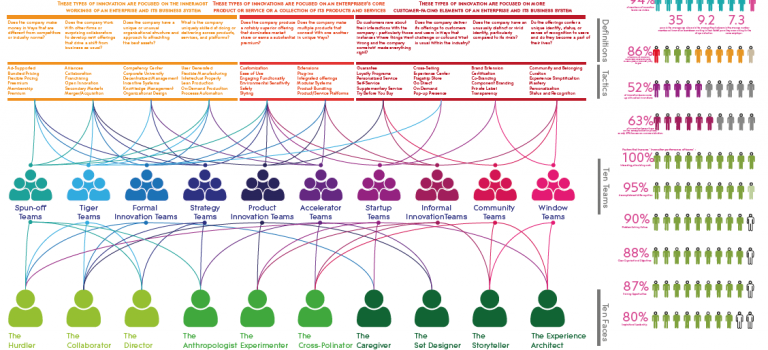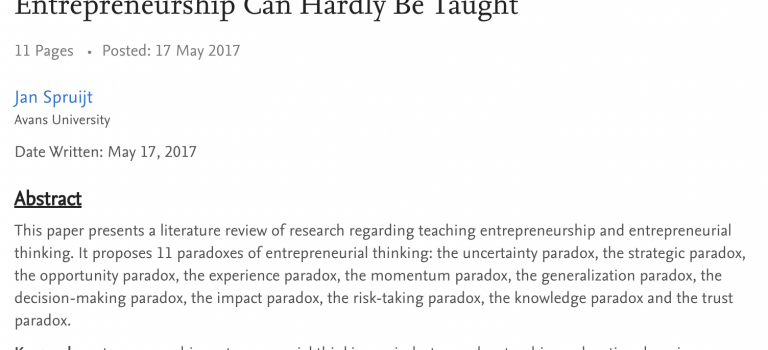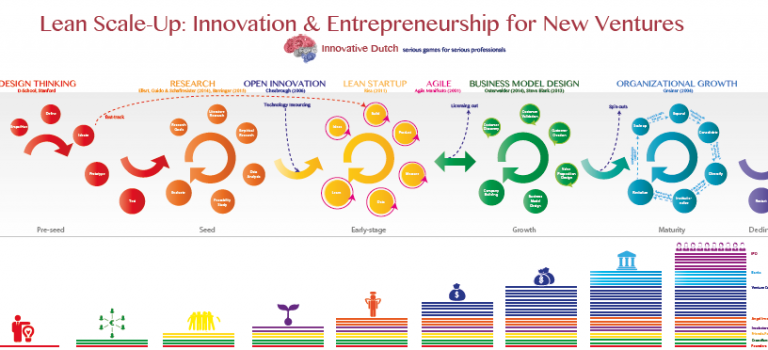This is an overview of some interesting open access papers published in the last two weeks!
Read moreEntrepreneurship

When Ten Faces flirt with Ten Types: Ten Types of Innovation Teams
When the book “Ten Types of Innovation” (Keeley et al.), in its most recent format, hit the shelves in 2013 – not only me, but many of my colleagues in higher education, embraced the work because of its clarity and integrality. It offered a much richer approach than the usual – perhaps more scientifically evidenced – approach of 4 types of innovation (product innovation, process innovation, business model innovation, service innovation). The work was, and still is, one of the most influential works used in our Business Innovation program and highly rewarded by both students and partners in the field. The infographic I made in 2014 based on this book has been one of the most downloaded infographics on this blog ever since.
Read more
11 Paradoxes of Entrepreneurial Thinking: why entrepreneurship can hardly be taught
Introduction
Entrepreneurial thinking is described as one of the most relevant skills for the 21st-century workforce (Bacigalupo, Kampylis, Punie, & Brande, 2016). And for that reason it has become an integral criteria in many prescriptive regulations for (higher) education and in increasing numbers also explicitly and implicitly part of curricula (Saavedra & Opfer, 2012). As opposed to entrepreneurship, entrepreneurial thinking is not necessarily bound to entrepreneurs (to be); it is an essential skill for ‘strengthening human capital, employability and competitiveness’ (Bacigalupo et al., 2016).
Read more
50+ Business Cases on Innovation & Entrepreneurship
During a course we developed at Avans University this winter, we asked students to gather relevant business cases on innovation and entrepreneurship in order to analyse them and prepare discussions around organization design. The course was based on the following model:
Do you have an open innovation strategy?
In today’s business environment, where startups play an increasingly important role and disruptions come from unexpected corners of the business arena, embracing external sources of knowledge as part of an open innovation strategy becomes crucial!
Rotterdam School of Management launches a new programme focused on implementing such an open innovation strategy with a particular focus on the role of startups. What is the role of startups in today’s business environment and how can corporates and startups effectively cooperate? During this intensive two-day RSM Executive Education programme, you will discover the latest academic perspectives of corporate venturing and its role in the corporate innovation process. Building on company cases and your own experience, you will learn best practices from experts, and exchange knowledge and experience with your peers.
More info can be found here.

The Lean Scale-Up: Innovation & Entrepreneurship for New Ventures
Traditionally, organization design (OD) is an area of expertise focused on the roles and formal structures of organizations. The main goal of OD would be to design the organization in such a way that it makes it possible for the company to reach its vision and thus facilitates the growth.
Read moreStanford Technology Ventures Program: already 50K subscribers
Next January, new (free) courses on Technology Entrepreneurship will be offered at Stanford University. The programs consist of separate video colleges of about 8-12 minutes each, counting up to almost 2 hours a week on course material. And above all, this is – amazingly – completely for free. We would like to recommend the following two courses:
Technology Entrepreneurship
Do you want to know how to get entrepreneurial spirit into your – small or large – organization? Do you want know how to accelerate entrepreneurship and create new markets? According to their program website, these are exactly the questions that you will get answers for. The course will teach you about taking risks, managing ideas and turn these into opportunities. The courses are provided by professor Chuck Eesly. In this video he will introduce himself and the course:
Subscribe direcly for this course here.
The Lean Launchpad
Do you rather want to know how turn ideas into small companies or start-ups, when you are aware when there is no big money available? Do you prefer not to care about business plans, revenue models and organization structures? Then you’re wright, because this class will teach you nothing about that. It will teach you about turning those small ideas in the interesting business models for start-ups. It will make you ready for real practice. Steve Blank, a serial entrepreneur, will tell you more about it:
Subscribe immediately here.
Are you in?
Please let us know below if you are following the course and what you’re expectations are. Have fun.